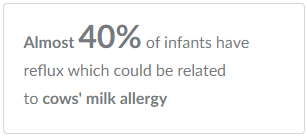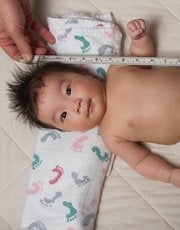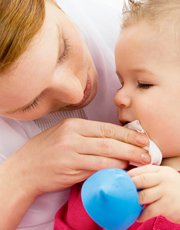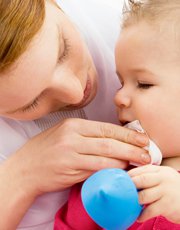
We believe breast milk is the best food for infants. When in consultation with their healthcare professional, mothers and families find that optimal breastfeeding is not possible due to their infant’s medical condition, formulas for special medical purposes play a vital role in providing essential nutrients to infants. We have a global commitment to market breast-milk substitutes responsibly.
This website is about the management of cows’ milk protein allergy and nutritional solutions intended for infants. By continuing on this website, you accept that Nestlé Health Science supplies the information at your own request.
Are you a healthcare professional (HCP) or a parent?
SYMPTOM: REFLUX AND REGURGITATION
What is regurgitation and reflux in babies?
Baby reflux occurs when a baby brings up milk during, or shortly after feeding.
Baby regurgitation is the backwards flow of milk from the stomach into the mouth, which is often ‘spat out’ by a baby. Regurgitation is not the same as vomiting, which is when milk is forced out from a baby’s stomach. Reflux and regurgitation are common in babies and generally resolve by 12 months of age.
Baby reflux symptoms
There are a symptoms of baby reflux to look out for:
- Bringing up milk or being sick during and/or shortly after feeding
- Coughing or hiccupping when feeding
- Being unsettled during feeding
- Swallowing or gulping after burping or feeding
- Crying and not settling
- Not gaining weight
Silent baby reflux is when your baby has signs of reflux, but will not bring up milk or be sick.


Why does my baby have reflux or regurgitation?
In babies, the lower oesophageal sphincter is not fully matured. This allows stomach contents to flow back up. Some factors causing baby reflux cannot be avoided, such as:
- Lying flat most of the time
- Consuming an almost completely liquid diet
- Being born prematurely
Occasionally, baby reflux and regurgitation can be caused by a food allergy such as Cows’ Milk Allergy (CMA). Having an immature digestive tract, lying flat most of the time and consuming an almost entirely liquid diet may also contribute to baby reflux and regurgitation.
Could my baby have Cows' Milk Allergy?
Babies with CMA usually experience more than just one symptom and these symptoms can be very different from one another.
If you think that your baby has reflux or regurgitation, it may be CMA. You may have even noticed other symptoms (besides reflux and regurgitation), which may affect other parts of your baby’s body.
For a simple and easy way to understand the symptoms associated with CMA, you can use our symptom checklist or symptom diary to track symptoms.
This will allow you to select all the symptoms that your baby may have that can be cows’ milk-related. You can then discuss these with your doctor.
Baby reflux treatment
Whilst there aren’t and specific remedies or treatments for baby reflux, there are a few things that can help alleviate symptoms:
- Hold your baby upright during feeding and for as long as possible after feeding
- Give formula-fed babies smaller feeds more often
- Burp your baby more frequently during feeds
- Ensure your baby sleeps flat on their back - they should not sleep on their side or front
- After feeding, keep your baby more upright
In any case, if you have any doubts or concerns about your baby’s health, you should always seek advice from a medical professional as soon as possible. The information on this website should not replace medical advice from a medical professional.















